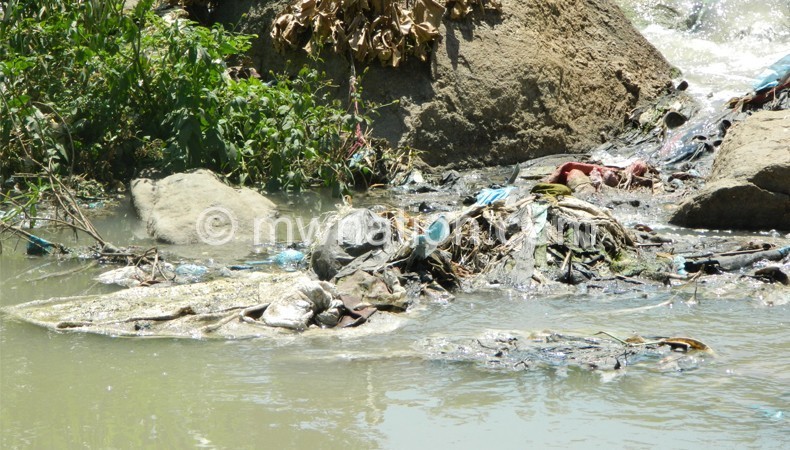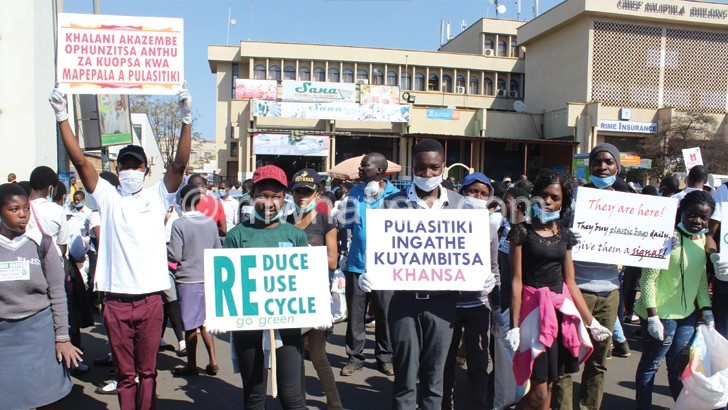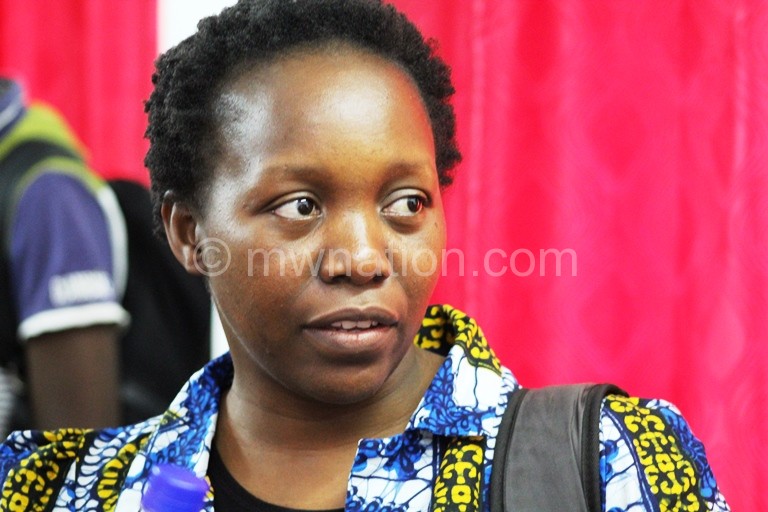Hard choices for plastic-free future
Bright Nyasaland quit school when he was in Standard Two, but he has learnt a lot from the world around him.
The 33-year-old sells potato chips at Chingeni Junction in Balaka where blue plastics cover open spaces like flowers in season and winds blow some of them into neighbouring crop fields. For years, crop yields in the windswept fields have been dwindling due to loss of soil fertility, shrinking size of land per person, pest attacks and changing climate. Plastics will most likely make the situation worse, fears Nyasaland.

He earns up to K10 000 a day from his roadside business, but he is worried that plastics may degrade his land by the time his three children are old enough to farm.
He explains: “We are putting too many plastics into the environment. The area no longer looks appealing. Our surroundings have become a meeting place for plastics that are smothering our world.
“When plastic bags cover land, rainwater cannot go into the soil. The problem is worse when the plastic is buried in the soil. Plant roots cannot penetrate. This disrupts the uptake of the nutrients they need to produce high yield. We are harming our future.”

However, Nyasaland and over 100 business people at the junction are part of the problem he laments with passion.
Every two days, he dishes out to customers over 100 lightweight plastics he buys at K200 from neighbouring wholesale shops. So do the businesses clustered at the junction where roads lead to Balaka, Lilongwe and Blantyre. As the people grab the hot bites from his smoky shop, they take away the lightweight plastics and discard them anywhere.
“The plastics are so cheap that people get them free of charge, but most of these plastics end up in crop fields, our main source of food and money,” he says.

Nyasaland, named after the colonial name of the country, backs the ban on plastics thinner than 60 microns, nostalgically remembering “the days my father used to bring foodstuffs in brown bags that decompose faster than plastics.
“Not long ago, the brown bags were sexy. Now, plastics have become part of life and many people cannot imagine life without them. We need to get back to things that are good for our land and children,” he says.
His futuristic brother, Patrick, sees future generations ruing the present population for polluting the planet with plastics.
They won’t forgive us for not embracing environmental friendly alternatives to jumbos,” he says.

There is a rising awareness of the environmental hazards of plastics and demand for alternatives that meet the present population’s requirements without eroding future generation’s ability to satisfy their needs.
New evidence from Lilongwe Wildlife Trust (LWT) shows that nearly all Malawians—94 percent—support the ban on thin plastics the Malawi Supreme Court of Appeal upheld on August 1.
The ruling by five judges permits the Environmental Affairs Department (EAD) to ensure everyone complies with the guidelines.
Deputy EAD director Michael Makonombera says the step-by-step clampdown mainly targets the source as Section 76 of the Environmental Management Act gives the department power to close noncompliant companies.
“We want to stop plastic pollution at the source. Besides sensitising the public on the ban and promote use of environmentally friendly alternative products, our inspectors will soon start enforcing compliance by the manufacturers, importers, distributors and users of thin plastics,” he says.
An independent assessment commissioned by AED with financial support from the United Nations Development Programme (UNDP) estimates that the country produces 75 000 tonnes of plastic a year and 80 percent cannot be recycled or reused.
The study by Jane Turpie, from Anchor Environmental in South Africa shows that a person in Malawi uses the highest amount of plastic waste in southern Africa—creating demand which far supersedes the capacity of current waste management systems.
“Rapid urbanisation, coupled with changing consumer demands, is driving further escalation in plastic production in Malawi. Based on population growth rates, it is estimated that by 2030 the amount of plastic waste generated in the capital city, Lilongwe, will be close to 32 000 tonnes – more than double that in 2014,” the findings show.
LWT campaign manager Yolanda Ng’oma, who co-authored the report, says kicking the blue plastics widely used by children and adults to carry foodstuffs “is a winning formula”.
“A reduction in the demand for such packaging can and will lead to the reduction in the supply of these unwanted plastic bags by food vendors,” she says.
Tiwonge Gawa, environmental scientist from Malawi University of Science and Technology, says the ban is not a magic bullet, but still an important move.
She said: “At least we have it in place that it is illegal to manufacture and illegal to use. Having legal structures in place is very important. Then the next step for us is to ensure that they are enforced and that they are not being manufactured.
“Just having the plastics not being manufactured is a big plus for us. We hope that the companies will follow through. This is just the beginning. In future, we can refine the ban and include other single-use plastics, which is great.
Gawa called for massive civic education for Malawians to understand why the lightweight plastics have been outlawed and “begin to accept that we can do without them.”
“When you take away something from people, they find an alternative,” she says. “While these plastics are still on the market, people feel they cannot do without them. But once they are not available, people will find alternatives.”
Gawa wants the citizenry to learn how to separate waste in readiness for recycling. However, the experience in Mzuzu—where Plan Malawi placed bins for trash that decomposes easily next to another for plastics and other goods that take long to biodegrade—reflects a scanty culture of sorting waste.
She states: “Having the ban in one place is one thing, now we need to handle all the plastics that is already out there. That plastic is not just thin plastic, but also single-use plastic which is just as bad. There are already some initiatives to recycle. For them to recycle, they must be able to access those plastics easily.”
“Next to that is to learn how to reduce, so many plastics that we know we can do without. After we learn to reduce, we learn to recycle those that we cannot do without. Those things that we can do without let us do without them. Those we cannot do without, let us use them in moderation.”
But most Malawians have grown up shopping with plastics. Nyasaland says it is almost a taboo to go home without a jumbo, saying “children and spouses seldom smile at an empty-handed breadwinner”.
This month, President Peter Mutharika was seen shopping with the banned plastic, a missed opportunity to amplify the ban and signal the nation to viable alternatives as did Magufuli in June when he was photographed in a marketplace carrying a wicker basket.
Gawa called for lifestyle change.
She says: “It’s a lot of work; it’s not going to happen overnight. There is need for civic education. The incident with the President was an offside. It means that people in high places simply do not care and that is what I pick quickly.
“We just banned these plastics and we cannot have the President going shopping with a plastic bag. He should have gone out with a basket or a brown bag just to show how important this ban is. So that was unfortunate and somebody did not do their job that day.”
Interestingly, the ban has already shaken up the way some institutions do business.
Among others, UNDP, which supports sustainable development, has banned thin and single-plastics during events it organises or funds. It urges its partners and service providers to embrace innovative environment-friendly ways of doing business.
On the free market, Game Stores at Chichiri Shopping Complex has started selling brown bags side by side with reusable plastic bags.
Kondwani Chamwala, spokesperson of Mulanje Mountain Trust, found it interesting to shop with the biodegradable paper bag as was the case before the liberalisation of trade over two decades ago. His organisation has put posters in hiking routes and trained tour guides to ensure tourists do not litter but descend the mountain with plastics they use or encounter on the way.
He considers reducing plastic waste pivotal to safeguarding the country’s tallest mountain, the second most popular tourist destination after Lake Malawi.
Chamwala has been to Sapitwa 11 times and says plastic waste is common in easy-to-reach places such as Dziwe La Nkhalamba.
He says: “It is exciting to have the plastic bag ban and more exciting to have a quick reaction from shops like Game coming in with brown bags. Plastics disposal has been an issue in Mulanje, especially to those who hike the mountain.
“The introduction of brown bag is a positive step towards beating plastic pollution. However, there is need for these bags to be affordable. The sustainable solution to a large extent is simply reusable shopping bags made of cloth. Malawians should see beyond today.
The Department of Energy wants the manufacturing industry to start churning out sustainable alternatives to fastback the shift from unwanted plastics and restore jobs affected by the ban.





